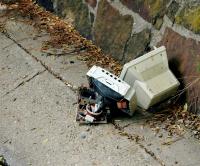More computers discarded by consumers in the United States are getting a second life in developing countries than previously believed, according to a new study -- the most comprehensive ever done on the topic -- reported in ACS' semi-monthly journal Environmental Science & Technology. The findings may ease growing concerns about environmental pollution with toxic metals that can result from dismantling and recycling computer components in developing countries.
 Discarded US computers are getting a second life in developing countries, a surprising new study shows.
Discarded US computers are getting a second life in developing countries, a surprising new study shows.
In the study Ramzy Kahhat and Eric Williams focused on the situation in Peru, where Kahhat was born. They used a Peruvian government database that tracks importation of new and used computers and computing equipment. The researchers found that at least 85 percent of computers imported into Peru are reused, rather than going directly into recycling.
The finding challenges the widespread belief that the trade in e-waste was mainly about dumping unusable junk or recycling components is inaccurate, at least for Peru. The U.S. is the source of up to 76 percent of used computers imported to Peru from 2003-2007, the researchers indicated. They note uncertainty on whether the same holds true for other, much larger countries like China and India.